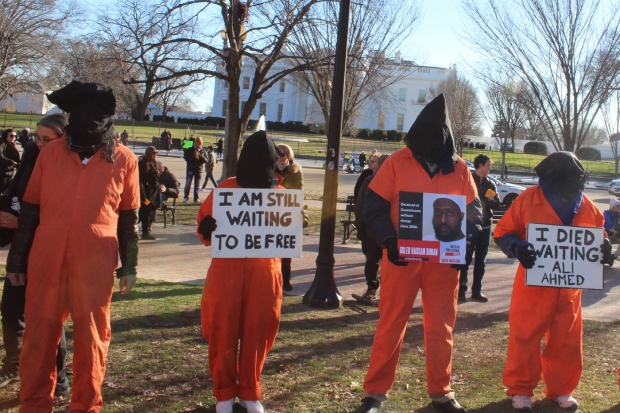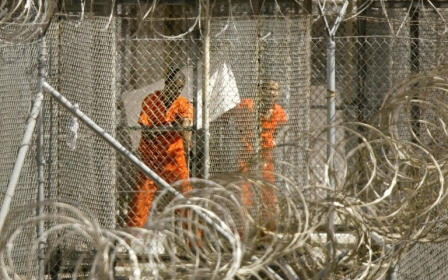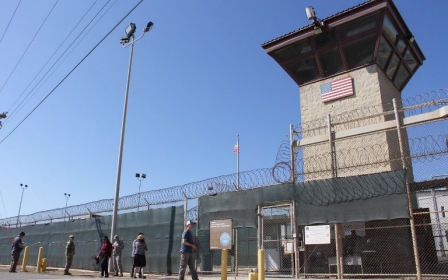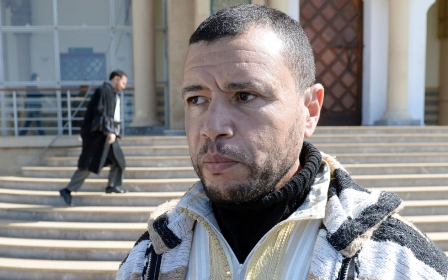Activists decry abuse at Guantanamo, 10 years after Obama ordered it shut
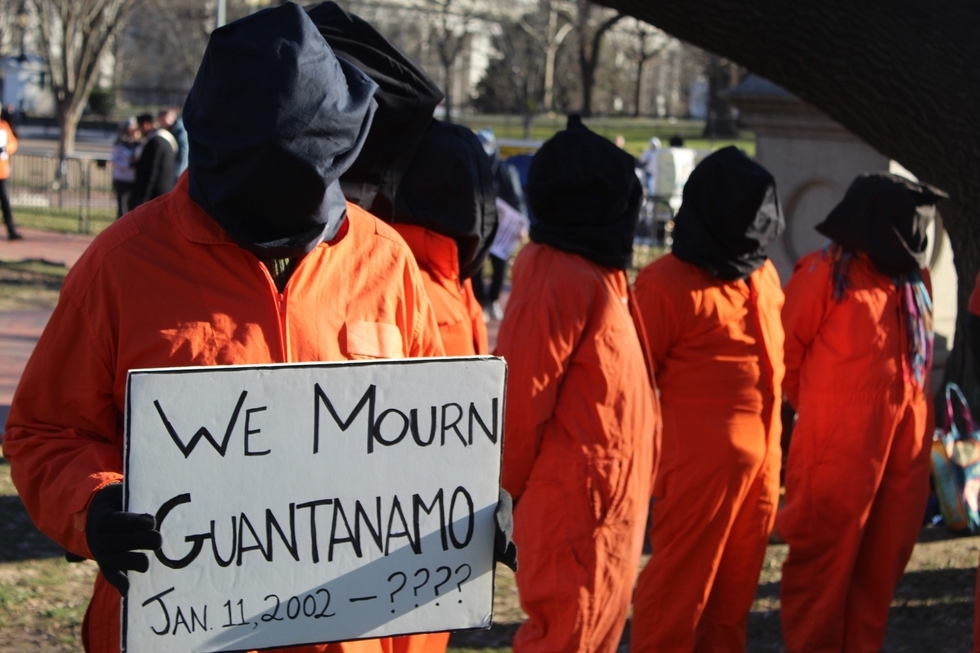
WASHINGTON - Guantanamo Bay inmate Tolfiq al-Bihani has been cleared for release, but 10 years after former President Barack Obama signed an executive order to shut down the detention facility, he and 39 others remain imprisoned without the prospect of freedom or a fair trial.
On Friday, dozens of activists gathered at a park across from the White House to demand closing the detention facility, which operates outside the US legal system.
Protesters in orange jumpsuits with black bags covering their heads, symbolising the abuse that Guantanamo prisoners have faced, stood with their backs to the White House as activists and legal experts denounced the continued detention of 40 people at the prison.
The facility, built on US-controlled land in Cuba, was set up to house suspected dangerous militants from US wars after the 9/11 attacks.
The demonstration marked 17 years since the detention facility opened and 10 years since Obama signed a decree to close it down "promptly".
Jessica Murphy and Leila Murphy, two sisters whose father was killed in the 9/11 attacks, said instead of ensuring justice for the victims Guantanamo has "compounded the tragedy of 9/11".
"We abhor the government's disregard for rule of law and its flagrant human rights abuses in the name of our father and other victims," they said, taking turns reading a joint statement.
'Source of shame'
British journalist Andy Worthington said the detention facility has been open for 6,210 days.
"That's 6,210 days of shame for every decent American… Every day this prison is open is a source of shame for all decent people," he told the crowd.
"This isn't an ordinary prison where people have been tried and convicted. This isn't a war prison where people are taken off the battlefield and held, protected by the Geneva Convention until the end of hostilities."
What Guantanamo is, Worthington said, is a place where people can be held without "any rights whatsoever as human beings".
This prison is unconstitutional, it is illegal and more importantly it is immoral and inhumane
-Aya Saed, Center for Constitutional Rights
He called the detainees political prisoners who have become political tools for President Donald Trump.
Indeed, the US president has repeatedly brought up Guantanamo to project an image of strength in the face of supposed danger from what he calls "radical Islamic terrorism".
Trump even mentioned the prison in his 2018 State of the Union, an annual speech to the nation in which presidents highlight their accomplishments and lay out their vision for the forthcoming year.
Furthermore, under his administration, the process of finding countries to transfer five inmates cleared for release, including al-Bihani, has been frozen.
As a candidate, Trump promised to keep the prison open and load it up with "bad dudes".
Last year, Trump revoked Obama's executive order to shut down the prison, proclaiming that the US can detain "certain persons captured in connection with an armed conflict for the duration of the conflict".
Critics say Trump's decree opens the door for indefinite detention of suspected militants, as the "War on Terror" has been going on for 18 years and has no end in sight.
For his part, Obama blamed lack of political consensus for his failure to follow up on the promise to down the facility.
"He wasn't bold enough," said Daphne Eviatar, Amnesty International USA's director of security with human rights, of the former president. "He could have done it at the very beginning. He had the support of Congress."
In the process of being "extremely careful", Eviatar told Middle East Eye, Obama slowed the process of transferring detainees, and when Republicans took over Congress in 2011, they refused to transfer suspects to the US for trial.
'Immoral and inhumane'
"This prison is unconstitutional, it is illegal and more importantly it is immoral and inhumane," said Aya Saed, who works at the Center for Constitutional Rights, which legally represents Guantanamo detainees.
While acknowledging the difficulty of progress under the Trump administration, Saed called for collective action on behalf of the prisoners.
"What I do hope is that their perseverance, their resilience, their will to get up every day to participate in hunger strikes inspires us to continue dreaming of a different world, imagining of a different reality," she said at the protest on Friday.
At an event organised by the Congressional Progressive Caucus and rights groups in Washington earlier on Friday, Mohamedou Slahi, a former in Guantanamo inmate who was held from 2002 until 2016, described the abuse he endured in the prison.
"In an attempt to force me to confess to crimes I did not commit, I was subjected to torture and to cruel and inhumane treatment," he told the attendees via video conference from Mauritania, where he was transferred in 2016, "as if losing my freedom, my livelihood and being forcibly separated from my loved ones wasn’t cruel enough."
The human rights activist and author of Guantanamo Diary, which he wrote when he was in the prison, added that his release did not end his suffering.
"I am still not free," he said, explaining that he has been denied a passport and can’t leave Mauritania.
"I am a prisoner in my own country," Slahi said. "I am being denied my freedom of movement" despite never having been charged with or committing any acts of terrorism or other crimes.
New MEE newsletter: Jerusalem Dispatch
Sign up to get the latest insights and analysis on Israel-Palestine, alongside Turkey Unpacked and other MEE newsletters
Middle East Eye delivers independent and unrivalled coverage and analysis of the Middle East, North Africa and beyond. To learn more about republishing this content and the associated fees, please fill out this form. More about MEE can be found here.


